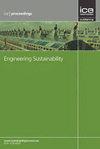在建筑、工程和施工领域实施负责任的采购
IF 1.5
4区 工程技术
Q3 ENGINEERING, CIVIL
Proceedings of the Institution of Civil Engineers-Engineering Sustainability
Pub Date : 2023-12-19
DOI:10.1680/jensu.23.00042
引用次数: 0
摘要
在过去的十年中,在建筑生产过程中采用综合的可持续实践已成为当务之急。有鉴于此,本研究对该行业采用 BES 6001 的个人经验进行了调查,以确定主题并提出改进方法,从而推动可持续发展的未来。本研究采用现象学方法,对参与 BES 6001 框架下产品认证的建筑、工程和施工行业专业人士进行有目的的抽样调查,并通过半结构化访谈(n = 6)收集 "生活经验 "数据。实施的主要益处包括:(a) 管理信念;(b) BES 6001 提供自动化、透明和负责任的报告;以及 (c) BES 6001 为利益相关者提供保证。与此同时,主要障碍包括:(a) 评估的复杂性和管理成本;(b) 中小型企业/小型供应链成员难以获得评估;以及 (c) 价值感。根据调查结果,提出了以下建议:(a) 应对 BES 6001 标准未来的修订计划进行咨询和评估;(b) 应对 BES 6001 认证的证据生产进行分析,以便为组织提供深入支持--如指导手册或类似文件;(c) 应考虑多个第三方认证,探索负责任采购的清晰综合方法。本文章由计算机程序翻译,如有差异,请以英文原文为准。
Implementing responsible sourcing in the architecture, engineering and construction sector
The last decade has witnessed an urgency to adopt integrated and sustainable practices within construction manufacturing processes. With this in mind, this study examines individuals’ experiences of the sector’s uptake of BES 6001 to determine themes and propose methods for improving the process driving towards a sustainable future. Using a phenomenological methodology and a strategy for purposive sampling of architecture, engineering and construction industry professionals involved in the certification of products under the BES 6001 framework, semi-structured interviews (n = 6) were used to collect ‘lived-experience’ data. The key benefits of implementation include (a) management belief; (b) BES 6001 providing automated, transparent and accountable reporting; and (c) BES 6001 providing assurance to stakeholders. Meanwhile, the key barriers include (a) the complexity and cost of administration of the assessment; (b) access for small and medium-sized enterprises/small supply chain members being challenging; and (c) the perception of value. Based on the findings, the following recommendations are proposed: (a) there should be consultation and assessment of planned future revisions of the BES 6001 standard; (b) there should be analysis of evidence production for BES 6001 accreditation, with a view to provide in-depth support to organisations – such as a guidance manual or similar; and (c) a clear and integrated approach to responsible sourcing should be explored, considering multiple third-party accreditations.
求助全文
通过发布文献求助,成功后即可免费获取论文全文。
去求助
来源期刊

Proceedings of the Institution of Civil Engineers-Engineering Sustainability
ENGINEERING, CIVIL-ENGINEERING, CIVIL
CiteScore
3.70
自引率
16.70%
发文量
44
审稿时长
>12 weeks
期刊介绍:
Engineering Sustainability provides a forum for sharing the latest thinking from research and practice, and increasingly is presenting the ''how to'' of engineering a resilient future. The journal features refereed papers and shorter articles relating to the pursuit and implementation of sustainability principles through engineering planning, design and application. The tensions between and integration of social, economic and environmental considerations within such schemes are of particular relevance. Methodologies for assessing sustainability, policy issues, education and corporate responsibility will also be included. The aims will be met primarily by providing papers and briefing notes (including case histories and best practice guidance) of use to decision-makers, practitioners, researchers and students.
 求助内容:
求助内容: 应助结果提醒方式:
应助结果提醒方式:


